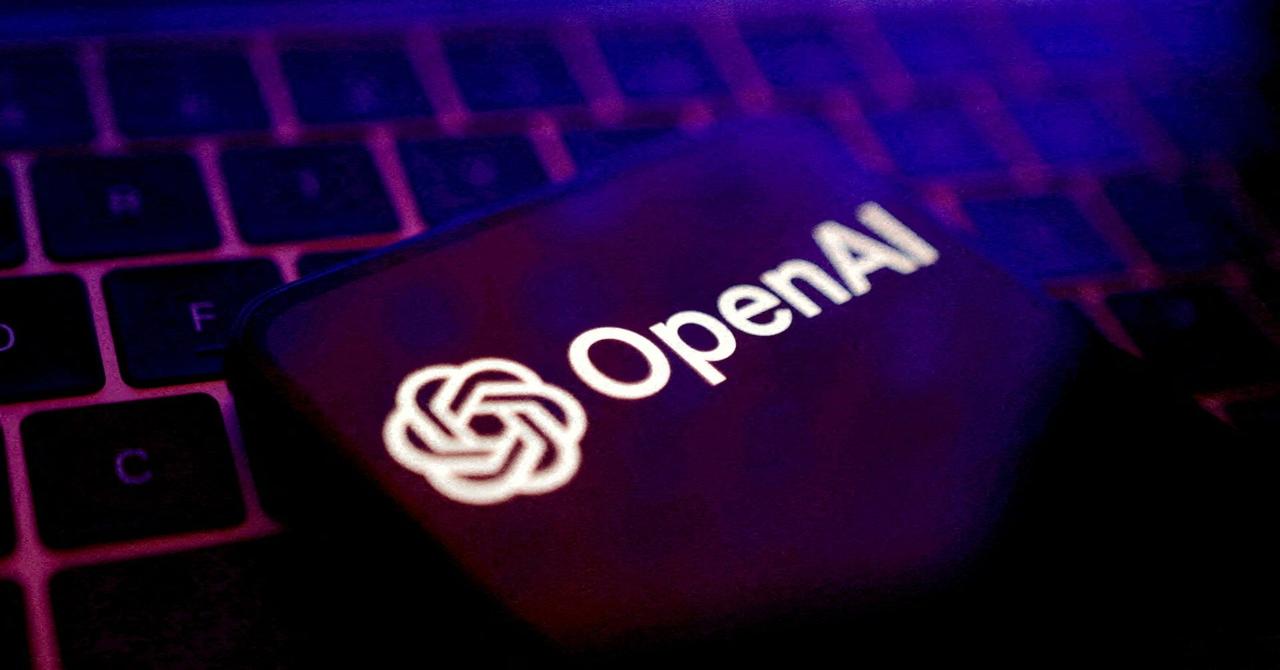Tech Giants Race to Develop Revolutionary AI Device, Led by OpenAI and Jony Ive
3 Sources
3 Sources
[1]
Big tech on a quest for ideal AI device
ChatGPT-maker OpenAI has enlisted the legendary designer behind the iPhone to create an irresistible gadget for using generative artificial intelligence (AI). The ability to engage digital assistants as easily as speaking with friends is being built into eyewear, speakers, computers and smartphones, but some argue that the Age of AI calls for a transformational new gizmo. "The products that we're using to deliver and connect us to unimaginable technology are decades old," former Apple chief design officer Jony Ive said when his alliance with OpenAI was announced. "It's just common sense to at least think, surely there's something beyond these legacy products." Sharing no details, OpenAI chief executive Sam Altman said that a prototype Ive shared with him "is the coolest piece of technology that the world will have ever seen." According to several US media outlets, the device won't have a screen, nor will it be worn like a watch or brooch. Kyle Li, a professor at The New School, said that since AI is not yet integrated into people's lives, there is room for a new product tailored to its use. The type of device won't be as important as whether the AI innovators like OpenAI make "pro-human" choices when building the software that will power them, said Rob Howard of consulting firm Innovating with AI Learning from flops The industry is well aware of the spectacular failure of the AI Pin, a square gadget worn like a badge packed with AI features but gone from the market less than a year after its debut in 2024 due to a dearth of buyers. The AI Pin marketed by startup Humane to incredible buzz was priced at $699. Now, Meta and OpenAI are making "big bets" on AI-infused hardware, according to CCS Insight analyst Ben Wood. OpenAI made a multi-billion-dollar deal to bring Ive's startup into the fold. Google announced early this year it is working on mixed-reality glasses with AI smarts, while Amazon continues to ramp up Alexa digital assistant capabilities in its Echo speakers and displays. Apple is being cautious embracing generative AI, slowly integrating it into iPhones even as rivals race ahead with the technology. Plans to soup up its Siri chatbot with generative AI have been indefinitely delayed. The quest for creating an AI interface that people love "is something Apple should have jumped on a long time ago," said Futurum research director Olivier Blanchard. Time to talk Blanchard envisions some kind of hub that lets users tap into AI, most likely by speaking to it and without being connected to the internet. "You can't push it all out in the cloud," Blanchard said, citing concerns about reliability, security, cost, and harm to the environment due to energy demand. "There is not enough energy in the world to do this, so we need to find local solutions," he added. Howard expects a fierce battle over what will be the must-have personal device for AI, since the number of things someone is willing to wear is limited and "people can feel overwhelmed." A new piece of hardware devoted to AI isn't the obvious solution, but OpenAI has the funding and the talent to deliver, according to Julien Codorniou, a partner at venture capital firm 20VC and a former Facebook executive. OpenAI recently hired former Facebook executive and Instacart chief Fidji Simo as head of applications, and her job will be to help answer the hardware question. Voice is expected by many to be a primary way people command AI. Google chief Sundar Pichai has long expressed a vision of "ambient computing" in which technology blends invisibly into the world, waiting to be called upon. "There's no longer any reason to type or touch if you can speak instead," Blanchard said. "Generative AI wants to be increasingly human" so spoken dialogues with the technology "make sense," he added. However, smartphones are too embedded in people's lives to be snubbed any time soon, said Wood.
[2]
Big tech on a quest for ideal AI device
New York (AFP) - ChatGPT-maker OpenAI has enlisted the legendary designer behind the iPhone to create an irresistible gadget for using generative artificial intelligence (AI). The ability to engage digital assistants as easily as speaking with friends is being built into eyewear, speakers, computers and smartphones, but some argue that the Age of AI calls for a transformational new gizmo. "The products that we're using to deliver and connect us to unimaginable technology are decades old," former Apple chief design officer Jony Ive said when his alliance with OpenAI was announced. "It's just common sense to at least think, surely there's something beyond these legacy products." Sharing no details, OpenAI chief executive Sam Altman said that a prototype Ive shared with him "is the coolest piece of technology that the world will have ever seen." According to several US media outlets, the device won't have a screen, nor will it be worn like a watch or broach. Kyle Li, a professor at The New School, said that since AI is not yet integrated into people's lives, there is room for a new product tailored to its use. The type of device won't be as important as whether the AI innovators like OpenAI make "pro-human" choices when building the software that will power them, said Rob Howard of consulting firm Innovating with AI Learning from flops The industry is well aware of the spectacular failure of the AI Pin, a square gadget worn like a badge packed with AI features but gone from the market less than a year after its debut in 2024 due to a dearth of buyers. The AI Pin marketed by startup Humane to incredible buzz was priced at $699. Now, Meta and OpenAI are making "big bets" on AI-infused hardware, according to CCS Insight analyst Ben Wood. OpenAI made a multi-billion-dollar deal to bring Ive's startup into the fold. Google announced early this year it is working on mixed-reality glasses with AI smarts, while Amazon continues to ramp up Alexa digital assistant capabilities in its Echo speakers and displays. Apple is being cautious embracing generative AI, slowly integrating it into iPhones even as rivals race ahead with the technology. Plans to soup up its Siri chatbot with generative AI have been indefinitely delayed. The quest for creating an AI interface that people love "is something Apple should have jumped on a long time ago," said Futurum research director Olivier Blanchard. Time to talk Blanchard envisions some kind of hub that lets users tap into AI, most likely by speaking to it and without being connected to the internet. "You can't push it all out in the cloud," Blanchard said, citing concerns about reliability, security, cost, and harm to the environment due to energy demand. "There is not enough energy in the world to do this, so we need to find local solutions," he added. Howard expects a fierce battle over what will be the must-have personal device for AI, since the number of things someone is willing to wear is limited and "people can feel overwhelmed." A new piece of hardware devoted to AI isn't the obvious solution, but OpenAI has the funding and the talent to deliver, according to Julien Codorniou, a partner at venture capital firm 20VC and a former Facebook executive. OpenAI recently hired former Facebook executive and Instacart chief Fidji Simo as head of applications, and her job will be to help answer the hardware question. Voice is expected by many to be a primary way people command AI. Google chief Sundar Pichai has long expressed a vision of "ambient computing" in which technology blends invisibly into the world, waiting to be called upon. "There's no longer any reason to type or touch if you can speak instead," Blanchard said. "Generative AI wants to be increasingly human" so spoken dialogues with the technology "make sense," he added. However, smartphones are too embedded in people's lives to be snubbed any time soon, said Wood.
[3]
Big tech on a quest for ideal AI device
ChatGPT-maker OpenAI has enlisted the legendary designer behind the iPhone to create an irresistible gadget for using generative artificial intelligence (AI). Apple is being cautious embracing generative AI, slowly integrating it into iPhones even as rivals race ahead with the technology.ChatGPT-maker OpenAI has enlisted the legendary designer behind the iPhone to create an irresistible gadget for using generative artificial intelligence (AI). The ability to engage digital assistants as easily as speaking with friends is being built into eyewear, speakers, computers and smartphones, but some argue that the Age of AI calls for a transformational new gizmo. "The products that we're using to deliver and connect us to unimaginable technology are decades old," former Apple chief design officer Jony Ive said when his alliance with OpenAI was announced. "It's just common sense to at least think, surely there's something beyond these legacy products." Sharing no details, OpenAI chief executive Sam Altman said that a prototype Ive shared with him "is the coolest piece of technology that the world will have ever seen." According to several US media outlets, the device won't have a screen, nor will it be worn like a watch or broach. Kyle Li, a professor at The New School, said that since AI is not yet integrated into people's lives, there is room for a new product tailored to its use. The type of device won't be as important as whether the AI innovators like OpenAI make "pro-human" choices when building the software that will power them, said Rob Howard of consulting firm Innovating with AI Learning from flops The industry is well aware of the spectacular failure of the AI Pin, a square gadget worn like a badge packed with AI features but gone from the market less than a year after its debut in 2024 due to a dearth of buyers. The AI Pin marketed by startup Humane to incredible buzz was priced at $699. Now, Meta and OpenAI are making "big bets" on AI-infused hardware, according to CCS Insight analyst Ben Wood. OpenAI made a multi-billion-dollar deal to bring Ive's startup into the fold. Google announced early this year it is working on mixed-reality glasses with AI smarts, while Amazon continues to ramp up Alexa digital assistant capabilities in its Echo speakers and displays. Apple is being cautious embracing generative AI, slowly integrating it into iPhones even as rivals race ahead with the technology. Plans to soup up its Siri chatbot with generative AI have been indefinitely delayed. The quest for creating an AI interface that people love "is something Apple should have jumped on a long time ago," said Futurum research director Olivier Blanchard. Time to talk Blanchard envisions some kind of hub that lets users tap into AI, most likely by speaking to it and without being connected to the internet. "You can't push it all out in the cloud," Blanchard said, citing concerns about reliability, security, cost, and harm to the environment due to energy demand. "There is not enough energy in the world to do this, so we need to find local solutions," he added. Howard expects a fierce battle over what will be the must-have personal device for AI, since the number of things someone is willing to wear is limited and "people can feel overwhelmed." A new piece of hardware devoted to AI isn't the obvious solution, but OpenAI has the funding and the talent to deliver, according to Julien Codorniou, a partner at venture capital firm 20VC and a former Facebook executive. OpenAI recently hired former Facebook executive and Instacart chief Fidji Simo as head of applications, and her job will be to help answer the hardware question. Voice is expected by many to be a primary way people command AI. Google chief Sundar Pichai has long expressed a vision of "ambient computing" in which technology blends invisibly into the world, waiting to be called upon. "There's no longer any reason to type or touch if you can speak instead," Blanchard said. "Generative AI wants to be increasingly human" so spoken dialogues with the technology "make sense," he added. However, smartphones are too embedded in people's lives to be snubbed any time soon, said Wood.
Share
Share
Copy Link
OpenAI partners with former Apple design chief Jony Ive to create a groundbreaking AI gadget, as tech companies compete to define the future of AI interaction.
OpenAI and Jony Ive's Collaboration Sparks AI Device Revolution
In a groundbreaking move, OpenAI has partnered with legendary designer Jony Ive, the mastermind behind the iPhone, to create a revolutionary AI gadget. This collaboration aims to redefine how users interact with generative artificial intelligence, moving beyond traditional devices
1
. OpenAI CEO Sam Altman has described the prototype as "the coolest piece of technology that the world will have ever seen," heightening anticipation for this mysterious device2
.
Source: France 24
The Quest for the Ideal AI Interface
As AI technology advances, tech giants are racing to develop the perfect interface for AI interaction. While current efforts focus on integrating AI assistants into existing devices like eyewear, speakers, and smartphones, many industry experts argue that the AI era demands a transformative new gadget
1
.Kyle Li, a professor at The New School, suggests that the lack of AI integration in people's daily lives presents an opportunity for a tailored product. However, Rob Howard of Innovating with AI emphasizes that the success of these devices will depend more on the "pro-human" choices made in software development rather than the hardware itself
2
.Learning from Past Failures and Current Initiatives
The tech industry is mindful of recent failures, such as the AI Pin by Humane, which was discontinued shortly after its 2024 debut due to poor sales
3
. Despite this setback, companies like Meta and OpenAI are making significant investments in AI-infused hardware2
.
Source: ET
Google has announced plans for mixed-reality glasses with AI capabilities, while Amazon continues to enhance its Alexa digital assistant for Echo devices. Apple, however, has taken a more cautious approach, slowly integrating generative AI into iPhones and indefinitely delaying plans to upgrade Siri with advanced AI features
1
.Related Stories
The Future of AI Interaction
Experts predict that voice commands will become the primary method for interacting with AI. Olivier Blanchard, research director at Futurum, envisions a hub that allows users to access AI through speech, potentially without an internet connection
3
. This aligns with Google CEO Sundar Pichai's concept of "ambient computing," where technology seamlessly blends into the environment2
.Challenges and Considerations
As the race for the ideal AI device intensifies, several challenges emerge:
- Energy consumption: Blanchard warns about the environmental impact of cloud-based AI processing, advocating for local solutions
3
. - User adoption: Howard anticipates fierce competition for the must-have AI personal device, noting that users may feel overwhelmed by multiple wearable options
2
. - Hardware vs. software balance: While new hardware is exciting, the success of these devices will largely depend on the AI software powering them
1
.
Despite these challenges, OpenAI's collaboration with Jony Ive and their substantial funding position them as strong contenders in this technological race. The recent hiring of former Facebook executive Fidji Simo as head of applications further strengthens OpenAI's pursuit of the ideal AI hardware solution
3
.As the tech industry eagerly awaits the unveiling of these new AI devices, it's clear that the future of human-AI interaction is on the brink of a significant transformation. However, as Ben Wood from CCS Insight notes, smartphones remain deeply embedded in people's lives and are unlikely to be completely replaced in the near future
1
.References
Summarized by
Navi
[1]
[2]
Related Stories
OpenAI and Jony Ive Collaborate on Revolutionary AI Device to Potentially Replace Smartphones
04 Feb 2025•Technology

OpenAI Acquires Jony Ive's io for $6.5B, Signaling Major Push into AI Hardware
22 May 2025•Technology

OpenAI's Ambitious Hardware Push: AI-Powered Devices in Development
19 Sept 2025•Technology

Recent Highlights
1
ByteDance's Seedance 2.0 AI video generator triggers copyright infringement battle with Hollywood
Policy and Regulation

2
Demis Hassabis predicts AGI in 5-8 years, sees new golden era transforming medicine and science
Technology

3
Nvidia and Meta forge massive chip deal as computing power demands reshape AI infrastructure
Technology





